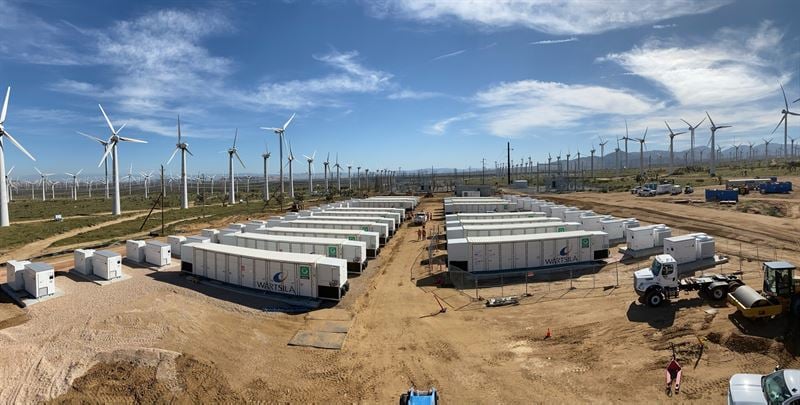
Andy Tang, VP of energy storage & optimisation for global energy technology group Wärtsilä, discusses software, supply chain, non-lithium storage technologies and more in this exclusive interview.
We start off by asking Tang about the second half of his job title: “The software piece is about optimising power flows and that goes hand in hand with the hardware piece, so we decided to add optimisation into into the business unit name,” he says.
Enjoy 12 months of exclusive analysis
- Regular insight and analysis of the industry’s biggest developments
- In-depth interviews with the industry’s leading figures
- Annual digital subscription to the PV Tech Power journal
- Discounts on Solar Media’s portfolio of events, in-person and virtual
Its main energy storage software is the GEMS energy management system (EMS) platform, brought into its portfolio through the acquisition of Greensmith Energy Management Systems Inc in 2017. Wärtsilä provides the platform as a standalone product as well as a way to manage its own energy storage products.
Tang says its AI-enabled optimisation platform for maximising storage revenues, the Intellibidder, is at a slightly earlier stage of maturity than the GEMS platform. In some of its projects like those for Pivot Power in the UK, the customer has opted for the GEMS platform for EMS but a separate provider for the market optimisation system.
“We intend to begin a marketing campaign around that and really change that situation,” Tang adds.
We ask Tang whether its lack of other types of renewable asset projects – Wärtsilä doesn’t develop solar or wind PV – was a problem for developing a market-competitive renewable energy optimisation platform, considering the amount of storage that is going to be co-located in future.
“So I absolutely agree that the next frontier in energy storage is hybridising with all sorts of power plants. I think that where we differ from some of the rest of the community is we define other power plants more broadly,” he says.
“We’re not looking at just deploying it with with solar or wind but we’re looking at deploying with those assets plus geothermal, plus hydro, plus fossil fuel burning assets. And I think it’s the plus fossil fuel burning assets that maybe makes Wärtsilä a little unique.”
He says that thermal plants will have a role to play in flexibility services until 4-12-hour-plus long duration storage technologies reach scale, which provides a nice segue into discussing non-lithium technologies for energy storage.
“There are a host of other technologies competing for long duration. I would like to see flow batteries get there, I really would. On a Powerpoint [presentation] it’s very compelling but it’s just not scalable. None of the companies have been able to produce multi-hour systems at a cost effective price. We’re still talking about 2025 and beyond.”
Tang also discussed supply chains at length, some of which was covered in a news story on the site last week. He says the BESS cost base has increased 25% year-on-year, mainly driven by battery cells which have gone from half of a typical balance-of-plant cost to close to two-thirds (for a basic, one-hour 50MW system).
Battery cells are in general increasing as a proportion of BESS projects’ cost structure as dispatch durations go up. For a four-hour system, battery cells are 70% of a balance-of-plant cost (based on the cost base from a year ago).
Like many others have done, Tang is calling for an investment tax credit (ITC) in the US for standalone storage similar to the one that exists for co-located projects.
“It (the co-location ITC) has some flexibility issues but it’s alive and well. When you look at the various initiatives and goals there are, in terms of hitting our decarbonisation targets, and the recent price increase because of raw materials pricing, I think a standalone ITC makes a lot of sense. It has bipartisan support although, considering our current government, I’m not optimistic about it happening anytime soon,” he says.
Wärtsilä is headquartered in Helsinki, Finland, and primarily provides power solutions in the energy and marine industries. It was the fourth-largest BESS integrator in IHS Markit’s 2021 rankings, after Tesla, NextEra and Fluence (in ascending order).
Energy-Storage.news’ publisher Solar Media will host the 1st Energy Storage Summit Asia, 11-12 July 2023 in Singapore. The event will help give clarity on this nascent, yet quickly growing market, bringing together a community of credible independent generators, policymakers, banks, funds, off-takers and technology providers. For more information, go to the website.

